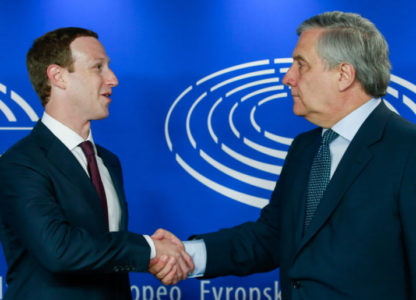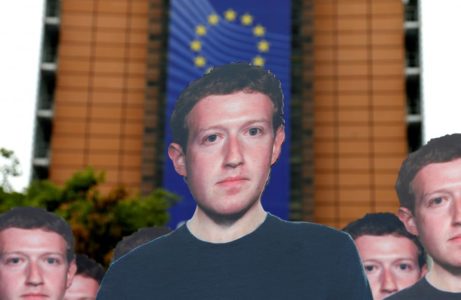Hard to Say I’m Sorry
Mark Zuckerberg in the European Parliament

Mark Zuckerberg with EP President Antonio Tajani (Politico)
Many times in life people experience personal failure or some fiasco. It is just a part of life. Usually, wise people learn from their mistakes while others tend to continue like nothing happened. An example of a total fiasco happened this week in the European Parliament, where the long-awaited founder and CEO of Facebook Mark Zuckerberg was hosted by the European Parliament President Antonio Tajani, who triumphantly announced last week that Zuckerberg is coming to the European Parliament to address the MEPs on some serious questions regarding data privacy and other issues his social media platform has been facing in recent times.
However, immediately after the visit was announced, criticism started and it continued on during and after the debate with Zuckerberg on Tuesday evening. The whole thing seems like some iconic football match where fans of one team are continuously blaming the judge for allowing the opposition team to play dirty. In the week when Europeans are increasingly struck with emails from their subscription companies regarding the General Data Protection Regulation (GDPR), one can see how much more has to be done to protect data privacy and European customers.
The main initial criticism regarding Zuckerberg’s visit to the European Parliament concerned the fact that it was supposed to be behind closed doors. Needless to say, the pressure was too big and it was decided that it would be aired live. The whole video is accessible on Youtube, and one could even check the summarized highlights, like it really was a true football match.
Zuckerberg opened up his remarks by stating that he was sorry and that he deeply regrets the fact that not enough was done to prevent the breach of, or manipulation of data, of European citizens. Just to remind, around 2,7 million Europeans have had their data obtained by the infamous Cambridge Analytica. After the opening remarks, the floor was passed on to the leaders of the political groups in the European Parliament.

Demonstration ahead of a meeting between Zuckerberg and leaders of the EP (Reuters)
For tango it takes two, and the hearing in the EP basically proved to be a format that significantly helped Zuckerberg to defend himself, because the MEPs used too much time, which is natural, having in mind that the next European elections are exactly in one year. The usual suspect was definitely Nigel Farage, a man rarely seen in Brussels, who claimed that Facebook is biased against right-wing views. At the end, Zuckerberg gathered up all the questions and selectively answered them in a very vague, insincere and incoherent way, something which should not satisfy European citizens, which rightly fear about the misuse of their data.
The media that follows European affairs was rightly so critical of the whole event, comparing it to the much more challenging US Senate hearing. The MEPs from political parties were furious, with Guy Verhofstadt from the liberal ALDE completely losing his temper, while Udo Bullmann from the social democratic S&D stated that the hearing in the European Parliament was a farce.
Unfortunately, the hearing was definitely disappointing and Mark Zuckerberg has managed to duck important answers that all of us wanted. His hearing only showed us that the European Parliament President did not do enough to secure an open, challenging and a transparent hearing event. For instance, some MEPs that are experts on the issue could not participate in the debate, as the participation was limited on the leadership level, while others rather preferred to have selfies with Zuckerberg. Finally, this Tuesday explicitly showed us how important it is to have the GDPR implemented, in order to protect EU citizens and their data.
